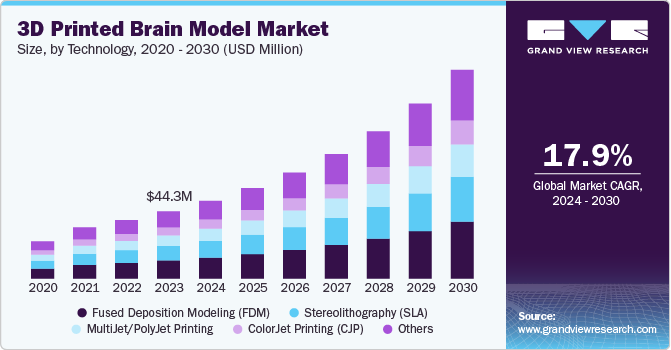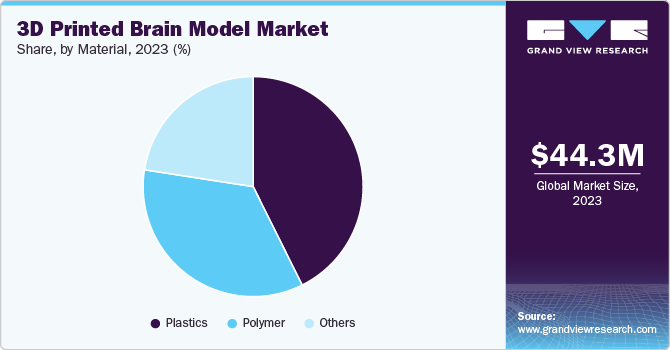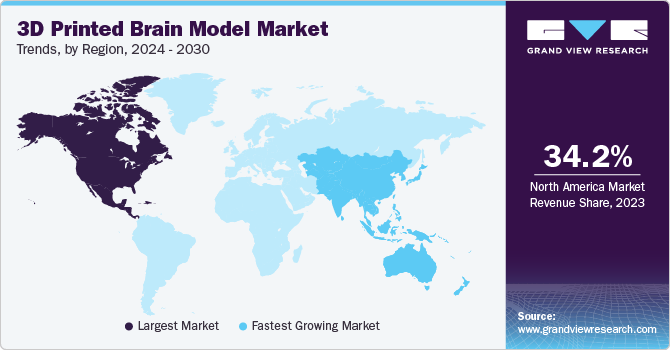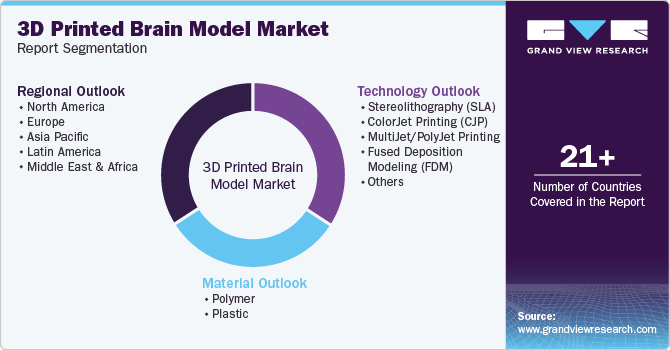
3D Printed Brain Model Market Size, Share & Trends Analysis Report By Technology (Stereolithography (SLA), ColorJet Printing (CJP), MultiJet/PolyJet Printing, Fused Deposition Modeling (FDM)), By Material (Plastic), By Region, And Segment Forecasts, 2024 - 2030
- Report ID: GVR-4-68039-717-3
- Number of Report Pages: 100
- Format: PDF
- Historical Range: 2018 - 2022
- Forecast Period: 2024 - 2030
- Industry: Healthcare
3D Printed Brain Model Market Size & Trends
The 3D printed brain model market size was valued at USD 44.3 million in 2023 and is projected to grow at a CAGR of 17.9% from 2024 to 2030. The growing demand for enhancements in neurological tools and procedures for personalized treatment of 3D-printed brain model applications in the medical device industry drives the market for 3d-printed brain design. The increasing occurrence of neurological conditions such as Alzheimer, Parkinson, and other disorders attributes to the rise in 3D-printed brain model demand in the forecast period.

The increased interest in 3D-printed brain models for educational purposes is driving market growth. Moreover, there is a growing demand for personalized healthcare, leading to the development of a new technology that models precise 3D brain surface anatomy for simulation and surgery planning. Doctors can create it using a standard brain model o tailor it for individual surgical needs to determine the suitable medical treatments for each patient. It is being utilized to instruct new operators on performing surgeries and to assess brain formations.
The increasing prevalence of neurological disorders such as Alzheimer's drives the market for 3D-printed brain models. According to the National Center for Biotechnology Information article published in April 2023, Alzheimer's is the fifth-leading cause of death in the U.S. Institutes are involved in discovering treatment solutions to benefit such complex disorders. For instance, the TU Wien (Vienna University of Technology) and Medical University Vienna collaborated in developing a high-resolution brain, brain-phantom, using the 3D-printing model in March 2024, which can be used for conducting advanced research for neurodegenerative diseases, including Alzheimer's and Parkinson. Such improvements in the field are helping the market growth.
Technology Insights
The Fused Deposition Modeling (FDM) segment dominated the market and accounted for a share of 26.9% in 2023. The growth can be attributed to the affordability and availability of this technology, as a desktop FDM 3D printer can be bought at a price starting from USD 250. With easy installation and compatibility with various materials, FDM offers more choices of materials and flexibility. It can also create complicated brain structures. FDM 3D printers are suitable for creating simple proof-of-concept models and rapidly prototyping basic parts at a low cost, including parts usually manufactured through machining. For instance, according to the National Center for Biotechnology Information data published in October 2022, FDM printers are widely used to produce protective face masks. The wide applications of this technology in various industries are expected to drive the segment growth.
Stereolithography (SLA) is projected to grow at the fastest CAGR of 17.8% during the forecast period. SLA resin 3D printers are preferred for their capability to make precise, uniform, and sealed prototypes and components using a various advanced materials with detailed characteristics and polished surface texture. For instance, an Israel-based startup Sprybuild reveals their new Stereolithography (SLA) 3D printer in March 2024, with enhanced resin flow. The SLA technology-based 3D printer can be used in a wide array of applications, including dental models, shoe soles, eyeglass frames, orthopedic insoles and combustible models for precision casting. Such innovations and a wide range of applications are expected to drive the segment growth.
Material Insights
Plastic materials accounted for the largest market revenue share of 42.7% in 2023. Along with a variety of advanced thermoplastics, the key factors driving the plastic materials segment due to their availability, practicality, biodegradability, compatibility, and efficiency with various 3D printing technologies. These advantages help drive the segment growth.

The polymer material market is expected to grow significantly as natural polymers such as gelatin and alginate can be used to create 3D-printed hydrogels for loading cells, which can be used to form human tissues and organs. Furthermore, natural polymers can be used as additives in plastic 3D printing filaments to reduce negative environmental impact and improve biocompatibility. In addition, polymer 3D printing enables customizable, versatile, and efficient printing, which can be used in the healthcare industry, such as in surgical pre-planning. The NXD 200Pro 3D printer by Nexa3D company is widely used in the dental industry allowing customization of dental implants using polymer 3D printing. The increased use of polymer-based 3D printers in healthcare contributes to the segment growth.
Regional Insights
North America 3D printed brain model market dominated the market with a revenue share of 34.2% in 2023. Growing market demand for individualized healthcare and the prevalence of neurological disorders are poised to support the market expansion. Countries such as U.S. and Canada have developed healthcare systems with significant investments in medical technologies, resulting in quick adoption and integration of this technology. Scientists at University of Wisconsin developed functional 3D printed brain tissue in February 2024, enabling to study brain functions and neurological disorders.

U.S. 3D Printed Brain Model Market Trends
The U.S. 3D printed brain model market accounted for the largest market share of the North America market in 2023. The adoption of these new technologies and fast-paced innovations owing to the presence of various medical research institutions and heavy investments in research and development attributes to the market growth. Furthermore, the industry growth is also attributed to established market players in this segment and increased awareness of the applications of 3D-printed brain models. According to the MJH Life Sciences data published in March 2023 states, nearly 90,000 people in the U.S. are diagnosed with Parkinson’s every year. Such increased prevalences of neurodegenerative disorders are encouraging researchers to innovate alternatives.
Europe 3D Printed Brain Model Market Trends
Europe accounted for a significant market share in 2023 in the 3D Printed Brain Model market. The rise in the geriatric population and increased prevalence of neurodegenerative disorders in the region drive the market growth in treating such disorders. According to the EU Joint Programme – Neurodegenerative Disease Research (JPND), about 16% of the European population is over 65 and is estimated to reach 25% by 2030. The aging population is highly susceptible to neurodegenerative disorders such as Alzheimer's and Parkinson’s, affecting approximately 7 million people in the region. Such prevalences are expected to drive market growth during the forecast period.
The growth can be attributed to countries such as UK which have made notable contributions due to their advanced healthcare systems and focus on research and development in this market. In addition, new innovations are helping the market grow. For instance, researchers at Oxford University developed 3D printing method in October 2023 to provide treatment for brain injuries.
Asia Pacific 3D Printed Brain Model Market Trends
The Asia Pacific 3D-printed brain model market is estimated to register the fastest CAGR over the forecast period. The main factors driving the market includes the increase in numerous players, the growth in undiagnosed patients with neurological diseases and therapy, and the rising demand for technological advancements. According to a Wiley article published in January 2023, nearly 8.8 million people above 60 years old are living with dementia, a common cause of Alzheimer’s. Such rising neurodegenerative disorders treatment drives market growth.
Key 3D Printed Brain Model Company Insights
Some key companies in the 3D Printed Brain Model market include ROKIT HEALTHCARE, INC, Medprin, 3D Systems, Inc., Formlabs. and Voxeljet AG. Key companies are involved in strategic initiatives such as innovating new products, collaborating with institutions and other industries, and establishing partnerships.
-
ROKIT HEALTHCARE, INC. is a biotechnology company that offers hyper-personalized organ regenerative healthcare solutions. The company uses regenerative medicine, autologous cells, cell sheet technology, and 4D fabrication technology to offer organ regeneration services.
-
CELLINK, a BICO group company, is a bioprinting company that provides advanced 3D bioprinting products and services. The company aims to transform the global healthcare industry by accelerating drug development, offering life science solutions combining biology and technology, and reducing organ shortage, ultimately transforming the healthcare industry worldwide.
Key 3D Printed Brain Model Companies:
The following are the leading companies in the 3D printed brain model market. These companies collectively hold the largest market share and dictate industry trends.- Stratasys
- CELLINK
- CYFUSE BIOMEDICAL K.K
- ROKIT HEALTHCARE, INC.
- MedPrin
- 3D Systems, Inc.
- Formlabs
- voxeljet AG
Recent Developments
-
In January 2024, the German service bureau PartsToGo invested in four Stratasys stereolithography (SLA) 3D printers aiming, to fulfil the increasing needs for industrial-grade prototyping, product testing, and end-use components.
-
CELLINK, a 3D bioprinting company, announced a strategic distribution partnership with Paralab, increasing its reach in Portugal and Spain.
3D Printed Brain Model Market Report Scope
|
Report Attribute |
Details |
|
Market size value in 2024 |
USD 51.2 million |
|
Revenue forecast in 2030 |
USD 137.5 million |
|
Growth rate |
CAGR of 17.9% from 2024 to 2030 |
|
Base year for estimation |
2023 |
|
Historical data |
2018 – 2022 |
|
Forecast period |
2024 – 2030 |
|
Quantitative units |
Revenue in USD million and CAGR from 2024 to 2030 |
|
Report coverage |
Revenue forecast, company ranking, competitive landscape, growth factors, and trends |
|
Segments covered |
Technology, material |
|
Regional scope |
North America; Europe; Asia Pacific; Latin America; MEA |
|
Country scope |
U.S.; Canada; Mexico; UK; Germany; France; Italy; Spain; Denmark; Sweden; Norway; Japan; China; India ;Australia; South Korea; Thailand; Brazil; Argentina; South Africa; Saudi Arabia; UAE; Kuwait |
|
Key companies profiled |
Stratasys; CELLINK; CYFUSE BIOMEDICAL K.K; ROKIT HEALTHCARE; INC.; MedPrin; 3D Systems; Inc.; Formlabs; voxeljet AG |
|
Customization scope |
Free report customization (equivalent up to 8 analysts working days) with purchase. Addition or alteration to country, regional & segment scope. |
|
Pricing and purchase options |
Avail customized purchase options to meet your exact research needs. Explore purchase options |
Global 3D Printed Brain Model Market Report Segmentation
This report forecasts revenue growth at global, regional, and country levels and provides an analysis of the latest industry trends in each of the sub-segments from 2018 to 2030. For this study, Grand View Research has segmented the global 3D printed brain model market report based on material, technology and region.

-
Material Outlook (Revenue, USD Million, 2018 - 2030)
-
Polymer
-
Plastic
-
-
Technology Outlook (Revenue, USD Million, 2018 - 2030)
-
Stereolithography (SLA)
-
ColorJet Printing (CJP)
-
MultiJet/PolyJet Printing
-
Fused Deposition Modeling (FDM)
-
Others
-
-
Regional Outlook (Revenue, USD Million, 2018 - 2030)
-
North America
-
U.S.
-
Canada
-
Mexico
-
-
Europe
-
UK
-
Germany
-
France
-
Italy
-
Spain
-
Denmark
-
Sweden
-
Norway
-
-
Asia Pacific
-
Japan
-
China
-
India
-
Australia
-
South Korea
-
Australia
-
-
Latin America
-
Brazil
-
Argentina
-
-
Middle East and Africa (MEA)
-
South Africa
-
Saudi Arabia
-
UAE
-
Kuwait
-
-
We are committed towards customer satisfaction, and quality service.
"The quality of research they have done for us has been excellent."




